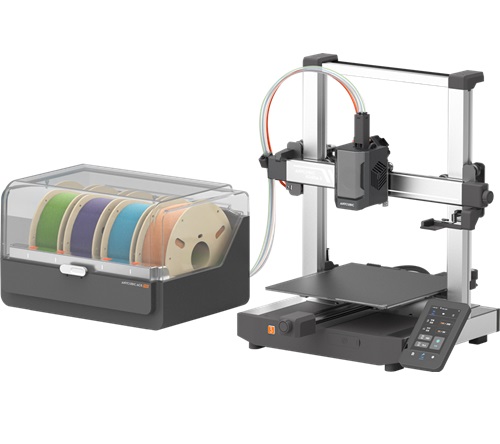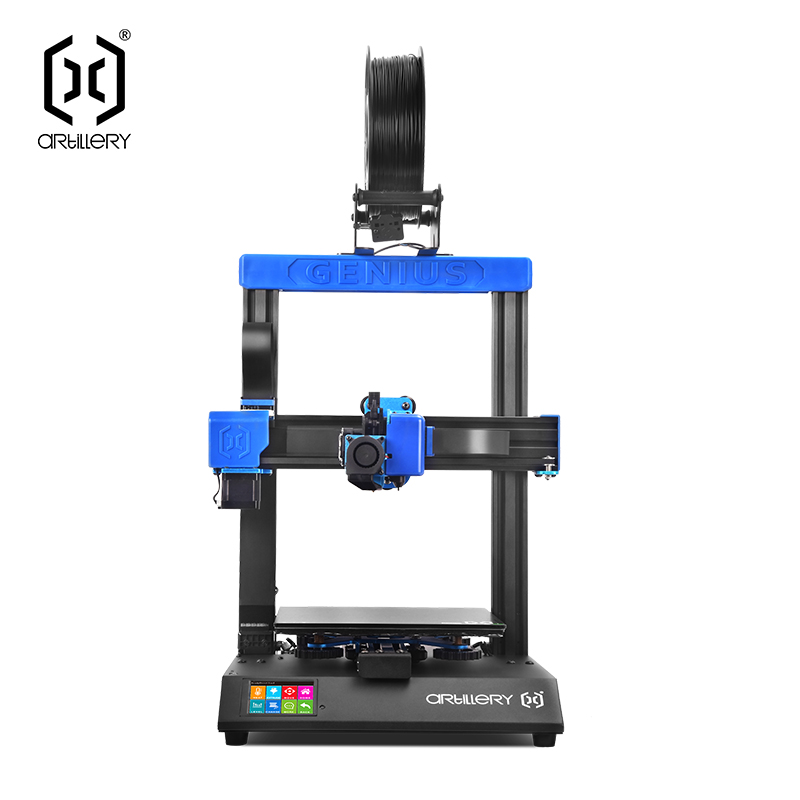Compare Kobra 3 Combo vs Genius Pro
Comparison between the best 3D printers
Choose the best 3D printer at the best price. The cheapest 3D printers are here.
Buy a 3D printer here with 3D Fila.
 |
 |
|
| Model | Kobra 3 Combo[BUY Kobra 3 Combo] |
Genius Pro[BUY Genius Pro] |
| Printing Material | Filament | Filament |
| Buy Filament for Anycubic Kobra 3 Combo | Buy Filament forArtillery Genius Pro | |
| Estimated price | $349,00 | $309,00 |
| Manufacturer | Anycubic | Artillery |
| Release Year | 2024 | 2022 |
| Print Volume [mm] | 250x250x260 | 220x220x250 |
| Printer Size [mm] | 452x504x483 | 430x390x590 |
| Weight [kg] | 9,2 | 9,6 |
| Power Loss Recovery | YES | YES |
| Enclosed printer | NO | NO |
| Bed Leveling | Automatic | Automatic |
| Filament End Sensor | YES | YES |
| Bed type | Heated | Heated |
| Power supply system | Direct Drive | Direct Drive |
| Standard nozzle | 0,4 | 0,4 |
| Maximum Nozzle Temperature [°C] | 300 | 240 |
| Maximum Bed Temperature [°C] | 110 | 120 |
| Maximum printing speed [mm/s] | 600 | 150 |
| Filament holder | YES | YES |
| Camera for supervision | NO | NO |
| Recommended filaments | PLA, PETG, ABS, PP, HIPS | PLA, PETG, Tritan, Flex, ABS |
| Recommended slicers | Anycubic Slicer, Cura, Orca Slicer | Cura, Simplify, Slic3r, IdeaMaker |
| Maximum Resolution [mm] | 0,1 | 0,1 |
| Processor | 32 bits | Ruby 32bit |
| Display | Touchscreen 4,3'' | Touchscreen TFT 3,5'' |
| Power Supply | 400 W | |
| Connectivity | USB, Wi-Fi, Cloud | SD / USB |
| Operating systems | Windows, Linux, Macbook | Windows, Mac, Linux |
| Date of registration in the system | 2024-06-27 | 2022-11-07 |
| Release date | 2024 | 2022 |
| Extra features | The Anycubic Kobra 3 Combo offers advanced features, including multi-filament printing with the ACE (Anycubic Color Engine) system, allowing for quick switching of up to four filaments. It features automatic bed leveling, nozzle clogging detection, and integrated filament drying during printing. The printer supports technical materials such as ABS, ASA, Nylon, and PC, thanks to the hotend that reaches 300°C and the heated bed up to 110°C. In addition, it has a 4.3-inch touchscreen and compatibility with various slicers such as Anycubic Slicer, Cura, and Orca Slicer. | The Artillery Genius Pro is a standout 3D printer with a fast-heating AC tempered glass print bed and a sleek design with a black aluminum base and blue accents. It features a Titan-style direct extruder and a 32-bit Ruby mainboard. Despite its advanced feature set, it struggles to maintain print quality, requiring frequent adjustments and calibrations, and its glued glass bed makes cleaning and replacement difficult. |
| Support for multiple colors and materials (AMS and CFS) | YES | NO |
Notes * |
||
| Cost-benefit | 8 / 10 | 7 / 10 |
| Hardware | 4 / 10 | 2.4 / 10 |
| Tela | . | . |
| Print volume | 4 / 10 | 3 / 10 |
| Performance | 5 / 10 | 1 / 10 |
| [BUY Kobra 3 Combo] | [BUY Genius Pro] |
Conclusion |
| In comparing the Anycubic Kobra 3 Combo and the Artillery Genius Pro, it is evident that both printers target different aspects of 3D printing, appealing to varied user preferences and needs. The Kobra 3 Combo, priced higher, demonstrates a strong performance with its advanced features, including the capability for multi-filament printing and a significantly higher maximum nozzle temperature. This allows it to accommodate a wider variety of materials, making it suitable for users looking to experiment with diverse filaments. Its automatic bed leveling and integrated filament drying functionalities enhance its usability, positioning it as a robust option for both beginners and advanced users seeking quality and efficiency. On the other hand, the Genius Pro, while more affordable, presents its challenges. Users may find it appealing due to its sleek design and ease of access with a quicker heating bed, but it tends to require more frequent adjustments and maintenance to sustain print quality. This can be a drawback for users who prefer a more hassle-free experience. Overall, if budget is a significant consideration, the Artillery Genius Pro offers decent features, albeit with trade-offs in performance and maintenance. However, for those willing to invest more upfront for enhanced capabilities, print quality, and versatility, the Anycubic Kobra 3 Combo clearly stands out as the superior choice. In terms of cost-benefit, it yields a more favorable assessment, especially for users who prioritize higher-quality output and a broader range of material compatibility. |

